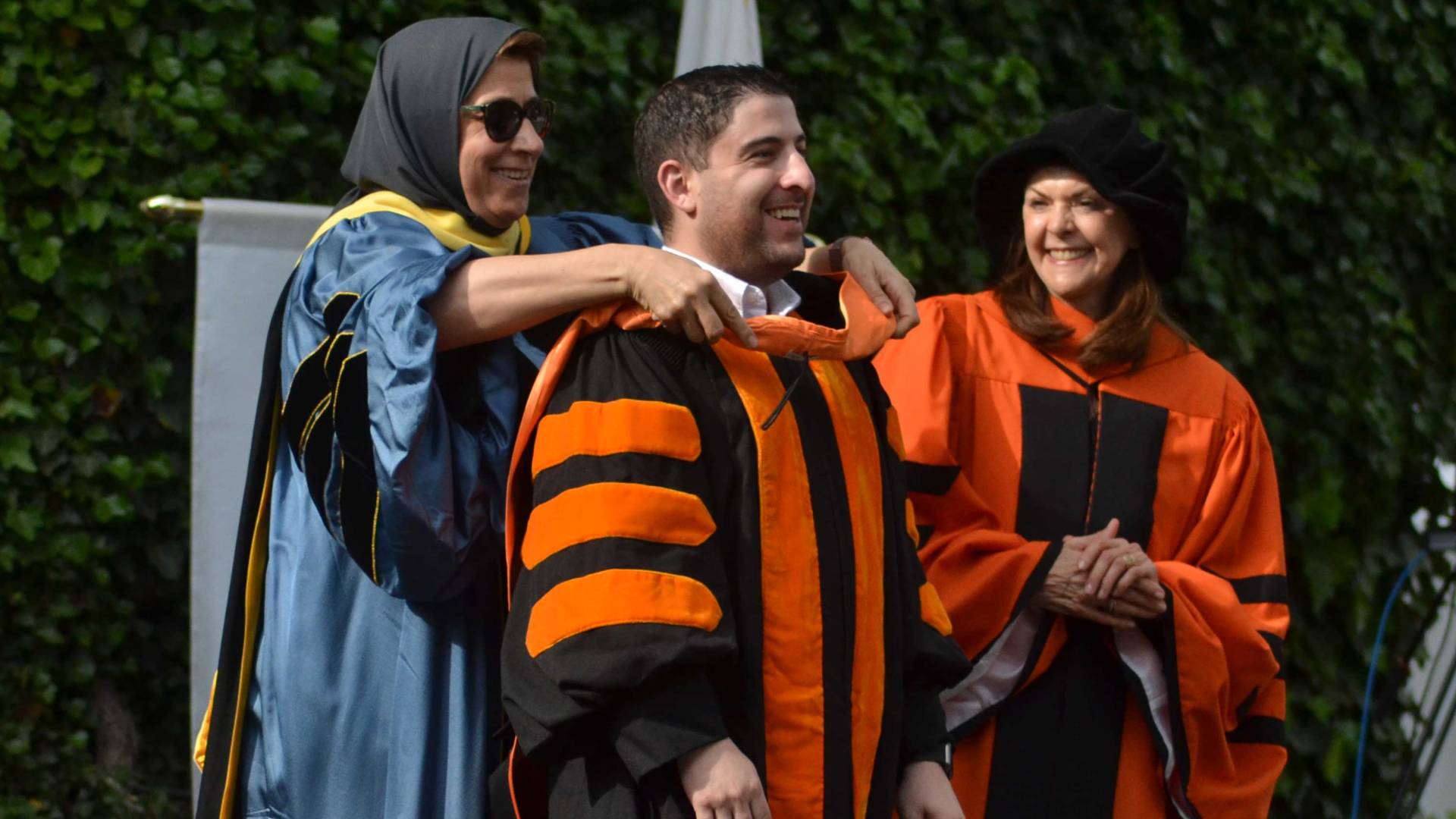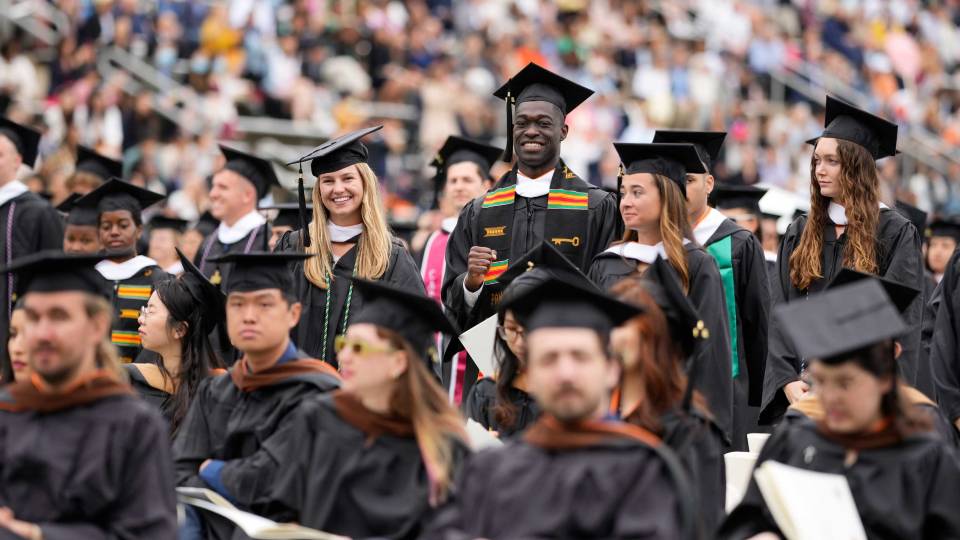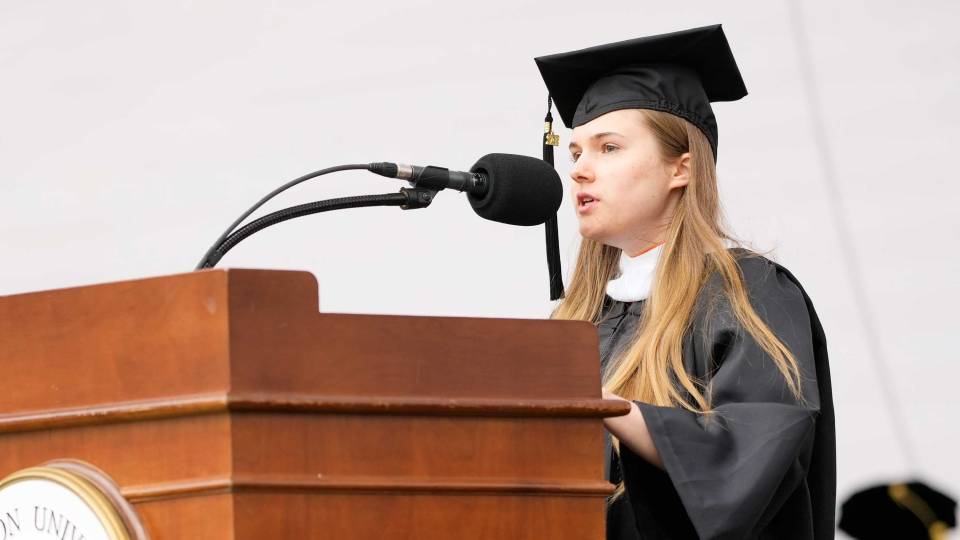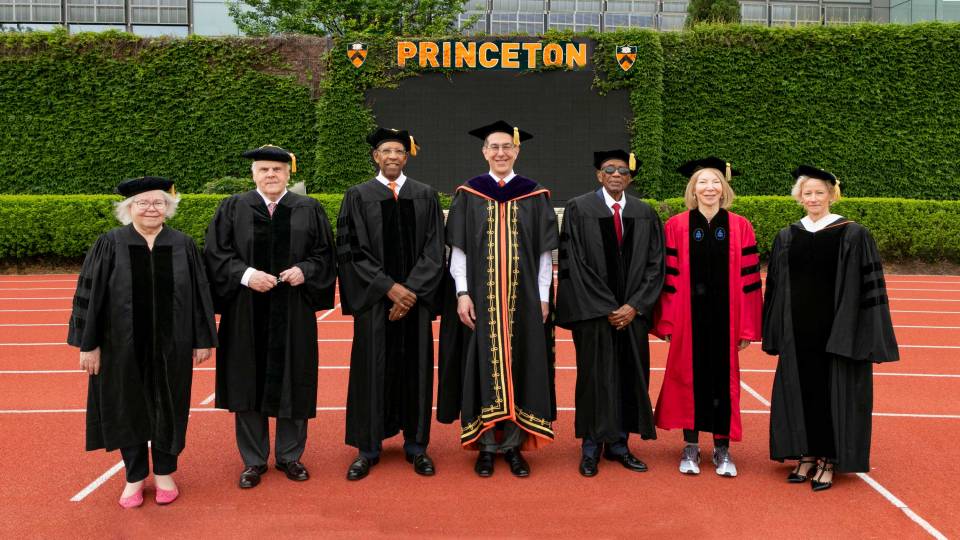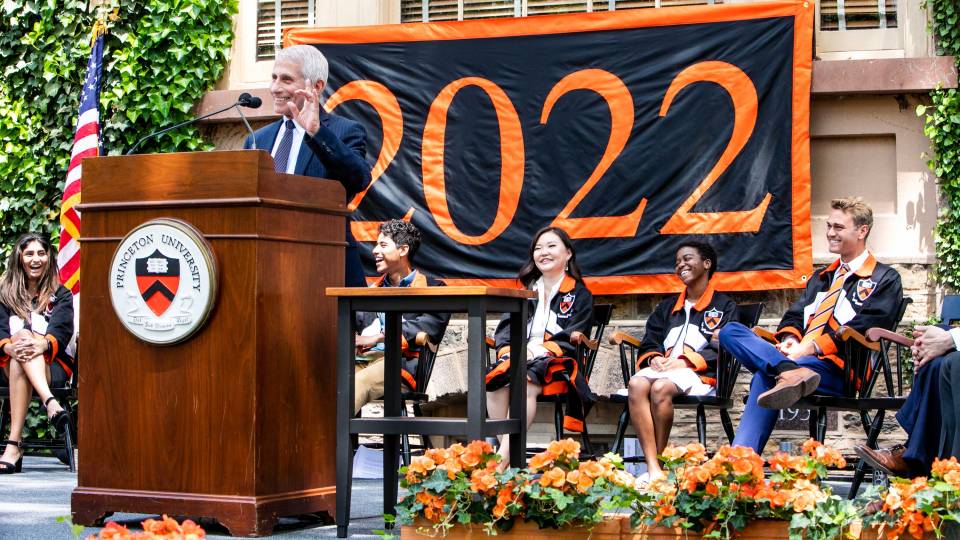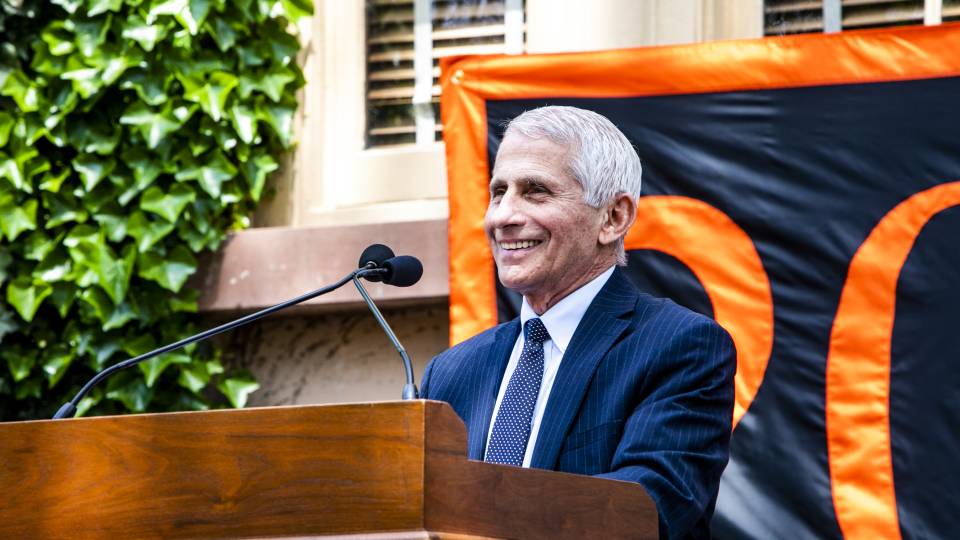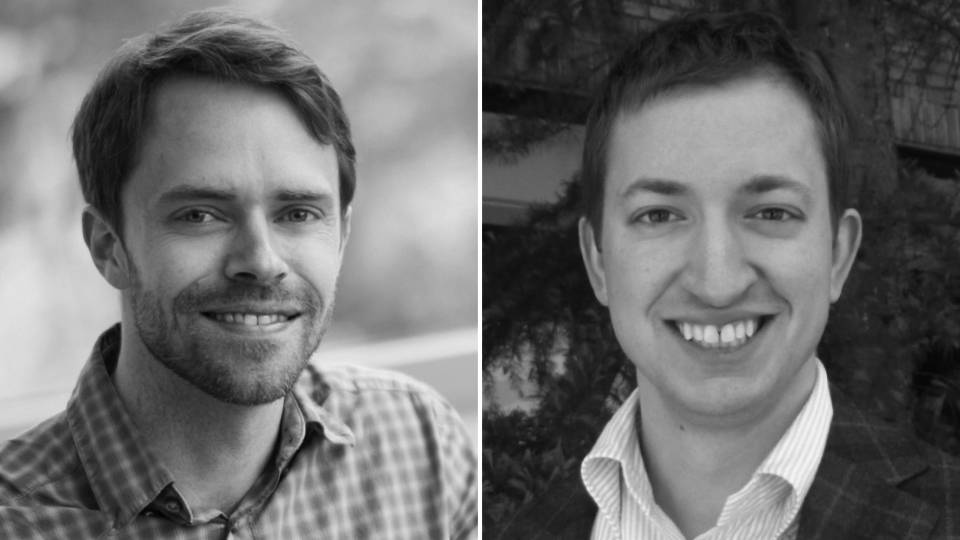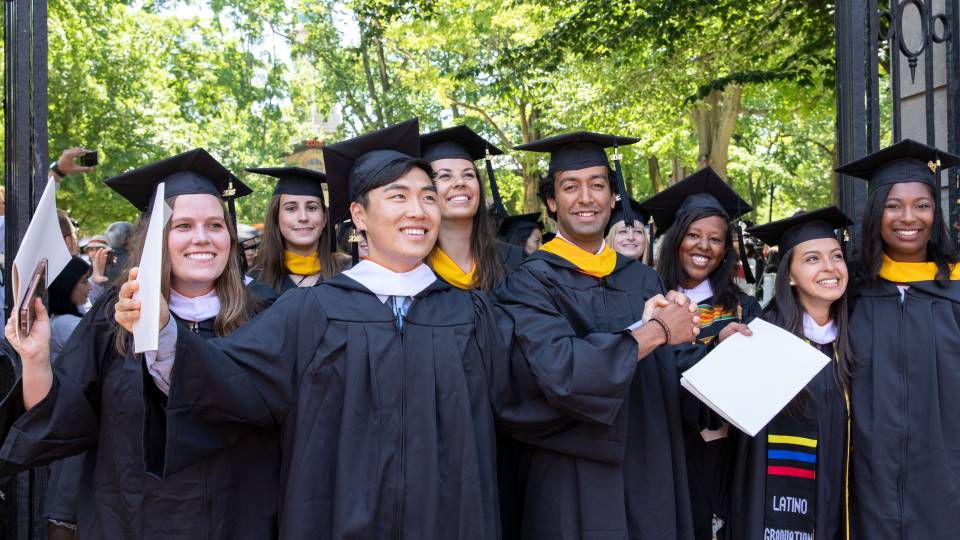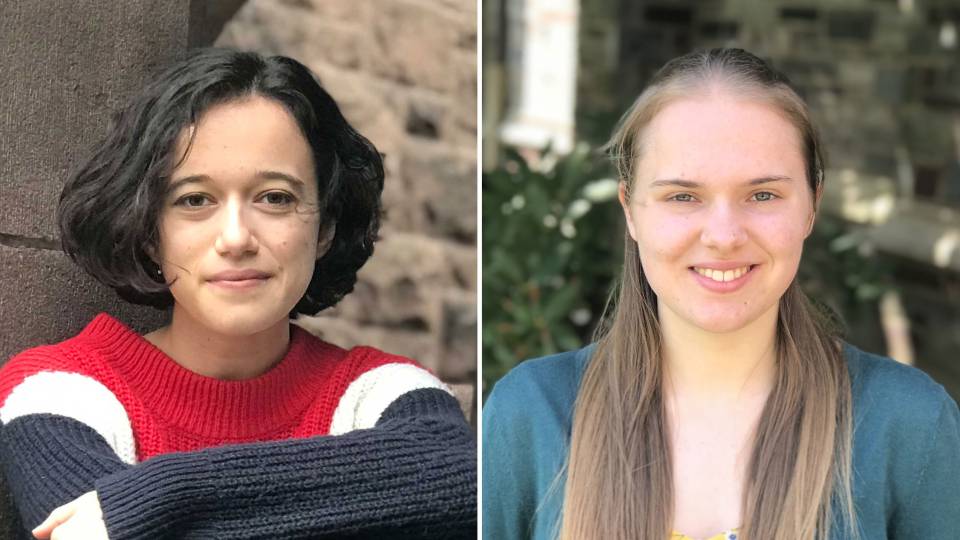Amaney Jamal (left), dean of the Princeton School of Public and International Affairs, hoods her advisee, Daniel Tavana (center), a newly minted Ph.D. in politics, at the 2022 Hooding and Recognition Ceremony. Looking on is Sandra Bermann, chief marshal for the University Convocations and the Cotsen Professor in the Humanities and professor of comparative literature.
Surrounded by family and friends on a sunny and brilliant day on Cannon Green, with Nassau Hall’s abundant ivy as a backdrop, recent Ph.D. and master’s degree recipients were honored for completing their academic journeys at Princeton at the 2022 Hooding and Recognition Ceremony.
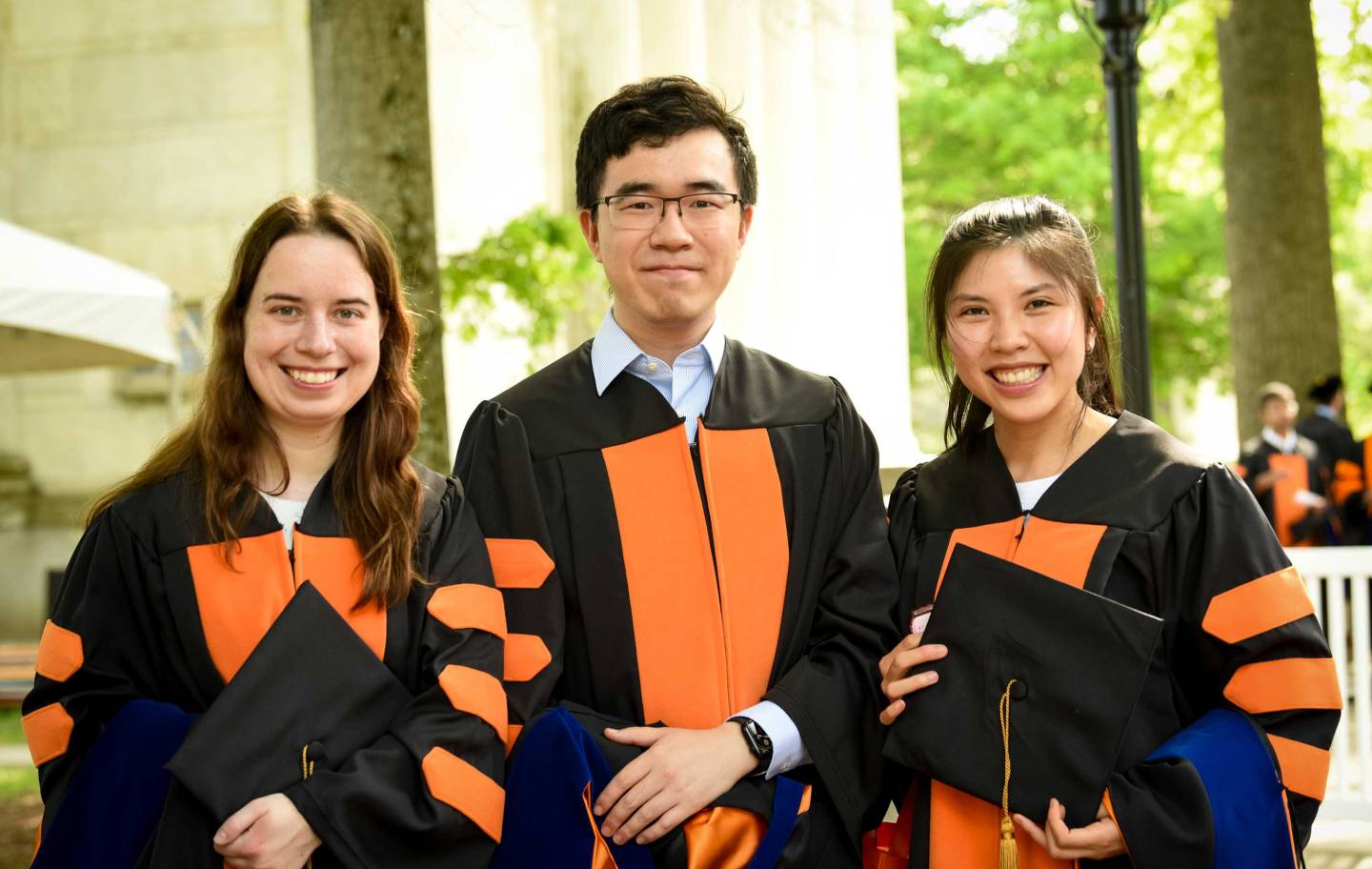
Juliane Preimesberger (left), who received her doctorate in mechanical and aerospace engineering, shares a moment before the ceremony with Wenxuan Zhang (center) and Thao Nguyen (right), who earned doctorates in chemical and biological engineering.
“This ceremony is a valuable opportunity for all of us — your families, friends, teachers, mentors and colleagues — to recognize the dedication, effort and intellect that you have brought to your work here,” President Christopher L. Eisgruber told the graduates. “Your graduate degree is a testament to your talent and commitment as well as a mark of true excellence in scholarship and research. Congratulations on this tremendous achievement!”
Cole Crittenden, acting dean and deputy dean of the Graduate School, began the ceremony by welcoming the graduates and their friends and families, and thanking faculty and staff for their contributions to the day’s events.
“Our purpose today is to recognize the extraordinary efforts, dedication and accomplishments of our graduates, to congratulate them for completing master’s and doctoral programs, and to celebrate their transitions into a broad range of careers in which they will make a tremendous contribution over the coming years,” Crittenden said.
The ceremony was the last with Crittenden presiding. He has served as deputy dean of the Graduate School for 10 years and as acting dean for the past two years. He will take on the role of vice provost for academic affairs in the Office of the Provost on July 1, when Rodney Priestley, the Pomeroy and Betty Perry Smith Professor of Chemical and Biological Engineering and vice dean for innovation, begins his tenure as the Graduate School’s dean.
At the ceremony, 178 master’s degree recipients were recognized by name as they walked across the stage. The 234 Ph.D. recipients in attendance were hooded either by faculty advisers or by Sandra Bermann, chief marshal for the University Convocations and the Cotsen Professor in the Humanities and professor of comparative literature. One-hundred-and-fifteen faculty members were in attendance.
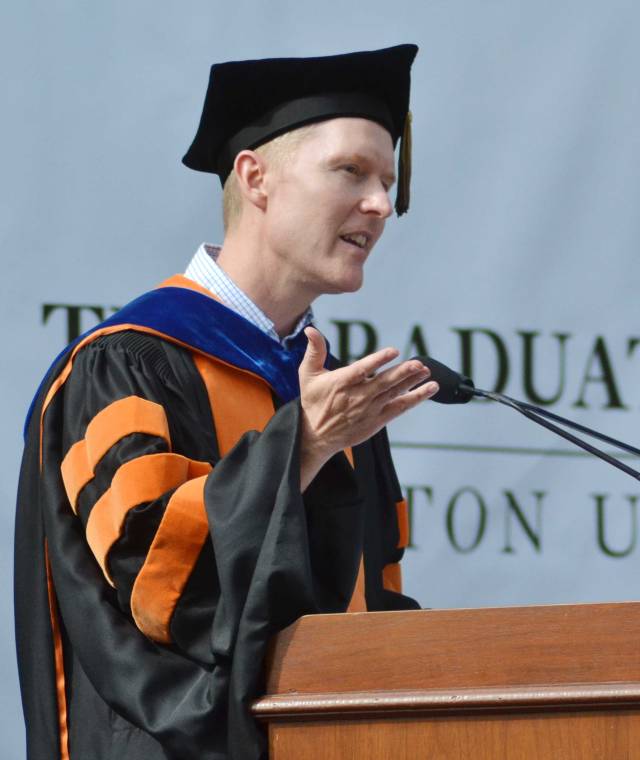
Cole Crittenden
The colorful gowns and hoods worn as part of traditional academic regalia trace their history to medieval Europe, where heavy woolen robes were necessities in the cold halls of universities. Hoods embody an important symbolism and distinguish the wearer both by rank and academic discipline. Each hood is bordered by a velvet band in the color assigned to the academic discipline in which the degree is granted, and the lining bears the degree-granting university’s own colors — at Princeton, orange with a black chevron.
“Your hood signifies the knowledge you have gained and the skills you have developed, as well as the fact that through your research you have contributed something genuinely new to an existing body of knowledge,” Crittenden said.
Crittenden also commented on the pleasantness of the weather — a relief for those wearing the heavy robes through extreme heat in the preceding days of Commencement activities. He expressed delight that “the weather gods have smiled upon us today.”

Christopher L. Eisgruber
Graduates described being hooded by their adviser as an opportunity to honor their years of mentorship, a time during which a faculty member guides an aspiring scholar on their journey to becoming a future colleague.
Elizabeth Durham, who earned a Ph.D. in anthropology, said her adviser João Biehl, the Susan Dod Brown Professor of Anthropology and director of the Brazil LAB, has been “exceptionally generous and thoughtful” from the start. Even before he became her adviser formally, he helped her to attend a forum on Ebola that was held in Dublin, obtaining for her an invitation and a plane ticket.
“I think anthropologists are particularly drawn to rituals and moments of transformation, which the Hooding ceremony certainly is,” Durham said. “After my Ph.D. defense in early May, people often asked me how it felt to be done; my answer was that I didn't feel done, not yet, not until the pomp and circumstance of being hooded and receiving my degree. It's particularly meaningful to me that I'll be hooded by someone who has watched and guided my own academic transformation over the course of seven years — that I'll step on the stage as João's student and step off as his colleague.”
Biehl praised Durham’s dissertation examining aspects of health and wellness in Cameroon, which he said, “offers a sharp and sensitive social and affective cartography of the ways patients and families navigate competing frameworks of wellness in clinical, political and religious arenas, stressing the vital importance of temporality to wellbeing.”

João Biehl (facing forward), the Susan Dod Brown Professor of Anthropology and director of the Brazil LAB, embraces his advisee, Elizabeth Durham, who earned a Ph.D. in anthropology. Durham said Biehl was “exceptionally generous and thoughtful” as her dissertation adviser.
“In Elizabeth’s hooding, we celebrate the generativity of comprehensive historical and people-centered research efforts and are humbled by what a love of humanity and a commitment to making a difference can bring into existence,” he said.
Eddie Glaude Jr., the James S. McDonnell Distinguished University Professor, professor and chair of the Department of African American Studies, characterized the relationship between adviser and advisee as “intimate and intense — a lifelong relationship that evolves.”
“The beauty of it all is that you get to watch them grow into seasoned scholars who produce their own students,” he said.
Glaude hooded his advisee, Nyle Fort, at the ceremony. “He is a gifted thinker who is passionately committed to a more just world,” Glaude said. “I loved that he came to Princeton right out the struggles in Ferguson. He wanted to think more carefully about what he was doing in his activism. He did it. And his dissertation will help others do the same.”
Amaney Jamal, dean of the Princeton School of Public and International Affairs (SPIA), who hooded several students including her advisee, Daniel Tavana, said being a doctoral adviser and mentor is one of her favorite parts of working in academia. “It’s extremely rewarding, watching this individual you’ve guided and whose success you’re invested in, attain such an important milestone,” she said. “And as a member of the University, it’s a role I’m very proud of performing on behalf of this institution.”

Nyle Fort (left) and his dissertation adviser, Eddie Glaude Jr., the James S. McDonnell Distinguished University Professor, professor and chair of the Department of African American Studies, line up together in the lead up to the Hooding ceremony.
The ceremony gave all of the advanced degree graduates an opportunity to reflect upon their experience.
Jordan Stoltzfus, a first-generation college student who received his master’s of public affairs from SPIA, started his academic journey at Columbus State Community College in 2014, earning an associate’s degree, and transferred to Ohio State University College of Arts and Sciences, where he completed his bachelor’s. He came to Princeton in 2020.
“Both of my parents had an 8th grade education, basically,” Stoltzfus said. “So just thinking about where I’ve come from, and the experiences I’ve had at Princeton is really humbling. I’m just totally grateful to the school and to my peers.”
Advanced-degree recipients are being awarded their degrees at Princeton’s 275th Commencement on Tuesday, May 24. The 655 graduate degrees granted during the academic year were:
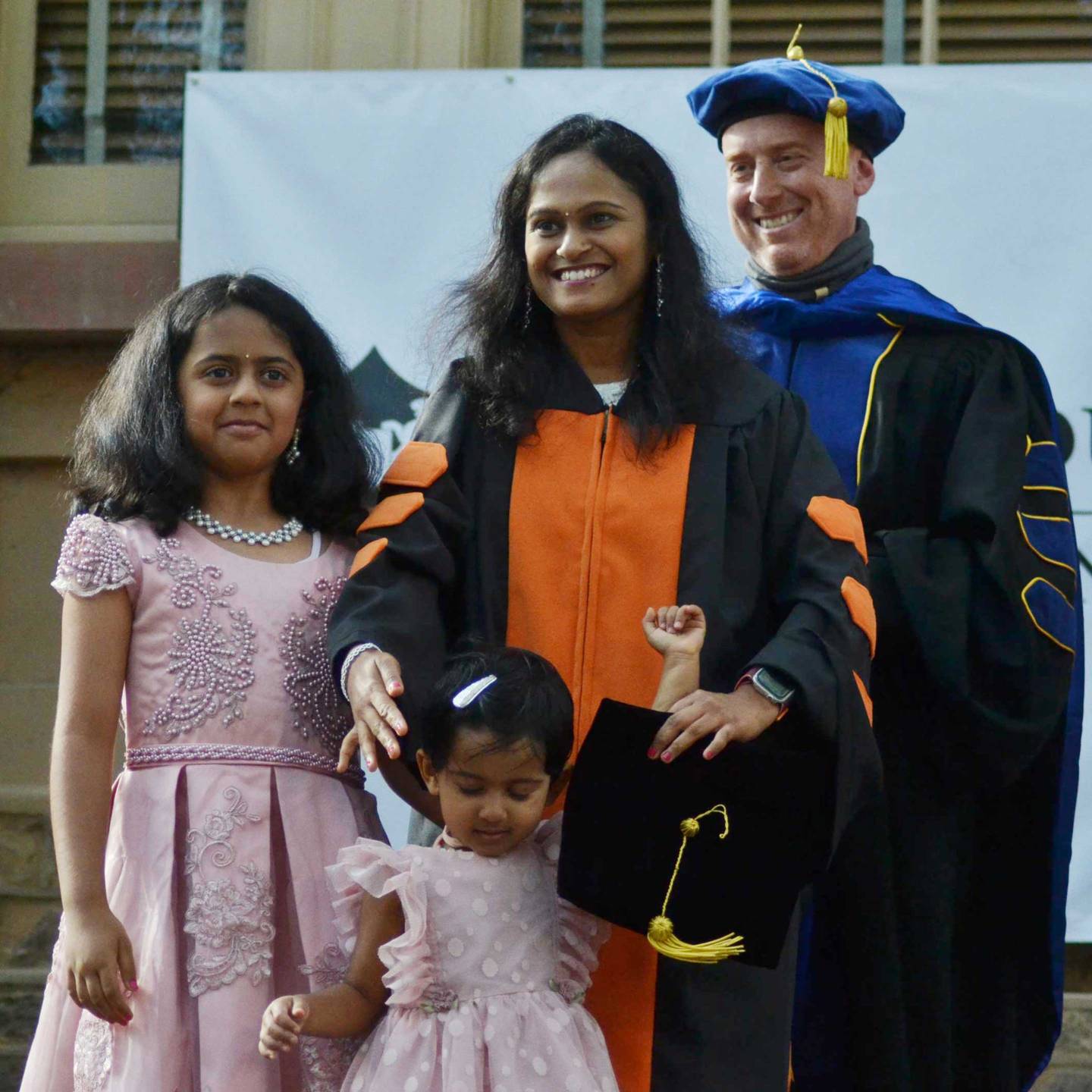
Nayana Prasad Nagendra (second from right), celebrates her hooding with her adviser, David August (far right), professor of computer science, and her daughters, Isha, 10, and Darsha, 3.
The graduate figures include:
- 447 Doctor of Philosophy
- 62 Master of Engineering
- 57 Master in Public Affairs
- 26 Master of Architecture
- 25 Master in Public Policy
- 21 Master in Finance
- 15 Master of Science in Engineering
- 1 Master of Arts in Near Eastern Studies
- 1 Master of Science
The 2022 recipients of the Graduate Mentoring Awards were honored during the Hooding ceremony. Presented by the McGraw Center for Teaching and Learning, the awards annually recognize faculty members for their exceptional work as mentors to graduate students at Princeton.
This year’s recipients Anna Arabindan-Kesson, assistant professor of art and archaeology and African American studies; Mark Brynildsen, associate professor of chemical and biological engineering; Curtis Callan, the James S. McDonnell Distinguished University Professor of Physics; and Natasha Wheatley, assistant professor of history.
In his remarks, Eisgruber reminded the graduates of their promise as leaders as they join the ranks of Princeton graduate alumni who have distinguished themselves. “Many have pursued careers that exemplify the power of disciplinary knowledge and rigorous training to change the world for the better,” Eisgruber said.“They do so with consistent excellence and ever-increasing diversity: diversity in the backgrounds from which they come, diversity in the topics they have studied, and diversity in the futures that they pursue.”
He added: “Your membership in this alumni community is at once an accomplishment and a call to action. I know that each of you will find your own path of service to the nation and to humanity.”
The Hooding and Recognition Ceremony is available for viewing online. End-of-the-year activities began with the Baccalaureate service on Sunday, May 22, and Class Day on May 23. Graduation activities conclude with Commencement on Tuesday, May 24.
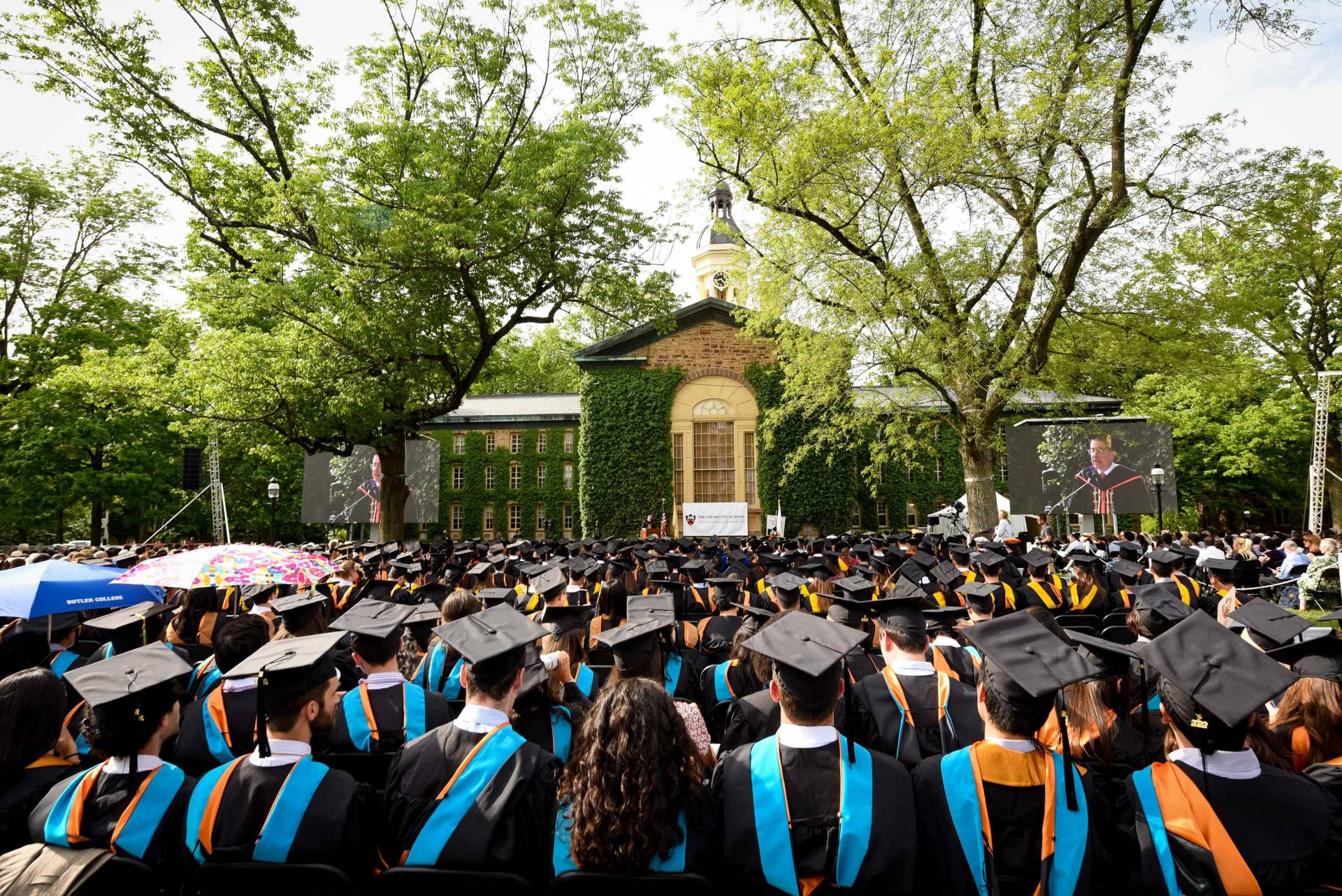
Friends and family of Princeton’s most recent Ph.D. and master’s degree recipients filled Cannon Green for the 2022 Hooding and Recognition Ceremony. Princeton awarded 655 graduate degrees granted during the academic year.
